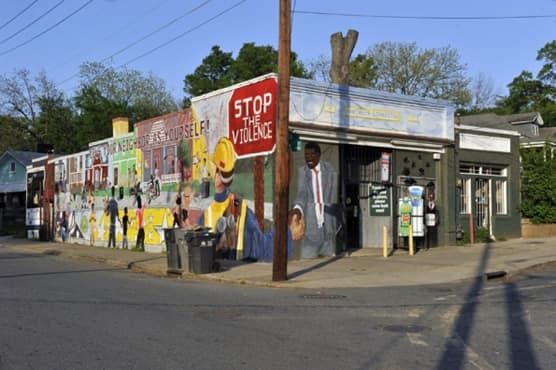
When Joe Howarth started working with UNC Charlotte’s Charlotte Action Research Project in Charlotte’s most disadvantaged neighborhoods in 2011, he kept hearing about the City of Charlotte’s Neighborhood Matching Grant program. The city program is designed to help neighborhoods with low to moderate resources improve their neighborhoods through grants for beautification projects and educational, public safety and youth programing. The program seemed like a good fit for some of the neighborhoods he was working with.
But not many had won the grants.
“There seemed to be a lot of neighborhoods, especially the ones we were working with, that just weren’t accessing the program,” said Howarth, a UNC Charlotte geography graduate student.
He began researching. That closer look confirmed his hunch. Howarth compared grant data for each neighborhood with the Charlotte Neighborhood Quality of Life study, which until last year classified neighborhoods as stable, transitioning or challenged based on an index of economic, social and crime statistics. He found that stable neighborhoods received more grants for larger amounts than either transitioning or challenged neighborhoods. Of the $2.1 million the city distributed from 1999 to 2012, stable neighborhoods received 96 grants totaling $934,200. Challenged neighborhoods received 48 grants totaling $412,829 in the same period. Thirty-eight percent of challenged neighborhoods received no grants.
The program requires that neighborhood groups or associations raise half of the funds for the requested grant through cash donations or volunteer hours. Neighborhoods with median household incomes or less than $57,489 are eligible to apply for the program. The matching provision explains why many challenged neighborhoods were unable to get the grants, Howarth stated.
“The stable neighborhoods, they don’t necessarily need the funds as much as the challenged neighborhoods, but they are better able to get them,” said Howarth. “The point of the grant program is that the neighborhoods can do what’s on their mind. But some neighborhoods need innovative ways to get the resources to do it.”
The application process also requires Internet access and experience. That’s not always a given in some challenged neighborhoods.
“The grant process is now entirely on the Internet,” Howarth explained. “And I think that’s a much better way to do it, but at the same time, there’s a lot of people who don’t have a computer, never worked on a computer before. So I think that there is a bit of a gap there.”
Howarth shared his finding with the City of Charlotte. After reviewing his work, City of Charlotte Program Manager Atalie Secoy said the city is considering putting in place a sliding scale, which would require less in matching funds from neighborhoods with lower incomes.
“This way, organizations that have a lower median household income than others who apply may have an equal chance in obtaining resources to meet the match,” Secoy wrote in an email.
This article first appeared on the Urban Institute’s PlanCharlotte website.
Photo: (Nancy Pierce) Charlotte's Belmont neighborhood won a Neighborhood Matching Grant in 2011 for computer skills training.